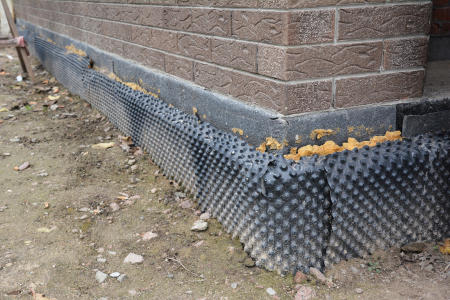
If you plan to eventually sell your home, basement waterproofing can maximize its resale value. Many buyers think twice before buying a home whose basement will require waterproofing. Some will even offer 10-15% below the value of a home if it will eventually need waterproofing.
Why Basement Waterproofing Increases a Home’s Resale Value
Water can damage a property’s foundation significantly. Once water seeps into a home’s basement, it can cause foundation leaks, cracks, and mold. Foundation damage affects the structural integrity of any building, lowering its resale value. Moreover, once mold grows in your home, it can negatively affect your family’s health.
Basement waterproofing protects the foundation, ensuring water will not seep in to cause structural damage. It involves installing a reliable drainage system for redirecting water away from the foundation. Such measures prevent water from damaging your home and they can enhance its resale value.
Exterior Waterproofing
Exterior waterproofing involves installing a coating or waterproof membrane on the basement walls after excavating the outside. This approach prevents water damage that may arise from wall leakage. Here are standard steps for exterior waterproofing:
- Soil excavation around the property’s affected areas.
- Membrane or waterproof coating application around the exterior walls.
- Drainage system installation to collect and drain water away from the building.
- Correcting the grading and installing extended downspouts in the affected areas if necessary.
Interior Waterproofing
Waterproofing the basement interior involves installing a reliable drainage system inside the basement walls. After installation, the system collects any water that may seep via the walls, channeling it away from the building. Here’s the standard procedure for installing this system:
- Sump pump installation to remove water from the basement.
- Sealing the walls with a high-grade vapor and water barrier.
- Installing a suitable under-slab drain system for collecting and directing water to the sump pump.
- Installing a suitable humidifier for eliminating moisture from the indoor air.
Drainage System
A drainage system is vital in basement waterproofing. It prevents water damage by collecting water from the building’s foundation and directing it away. Here are the available options for this drainage system:
- Surface drains: This system collects water that may pool on the surface around your home and directs it away from its foundation. It uses trench drains in the garage, entryways, or other hard surfaces.
- French drains: This system uses a trench that experts dig around the basement’s perimeter. Also, they install a piping system with gravel surrounding it. Depending on the condition of the ground surrounding your home, they may fill the trench with gravel and direct the excess water to daylight discharge points and the sump pump.
Is Basement Waterproofing Necessary When Planning to Sell Your Home?
Waterproofing the basement is an investment that increases your property’s value. You can expect up to 30% return on investment from your basement waterproofing project. Here’s why you should waterproof your basement when planning to sell your home:
- A home with a dry basement captures the interest of many buyers.
- A dry basement increases the home’s value.
- Waterproofing makes selling a home easier.
Nobody wants to buy a home that will require them to invest in basement waterproofing a few months after acquiring it, unless it sells at a price that’s way below its value. So, invest in basement waterproofing to sell your home faster and at a higher price.
Post sponsored by our friends at Foundation Repairs Winnipeg